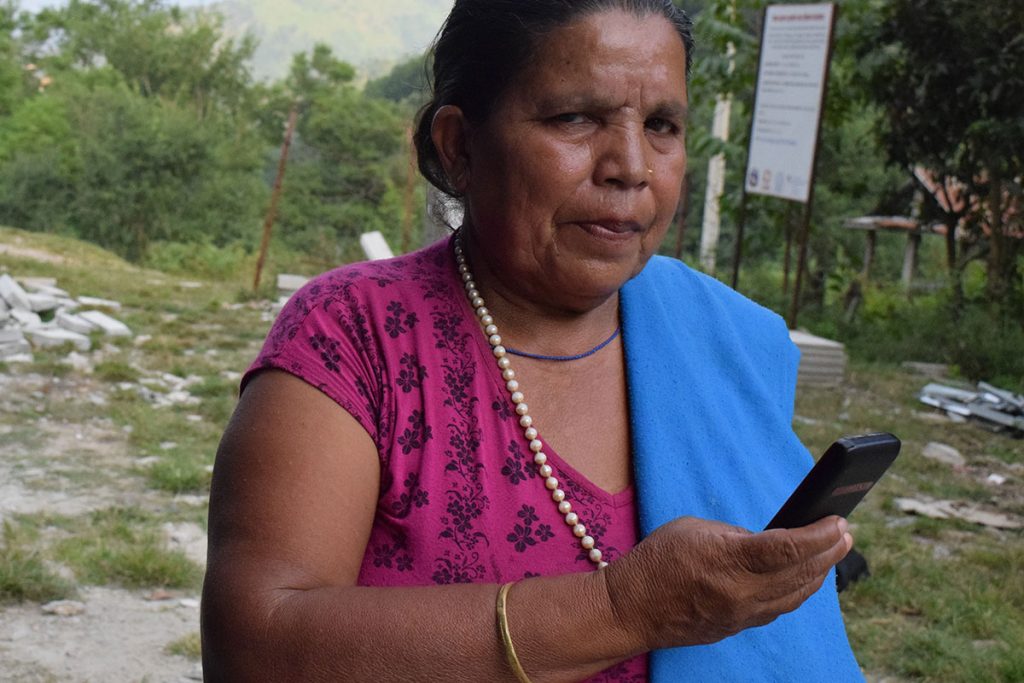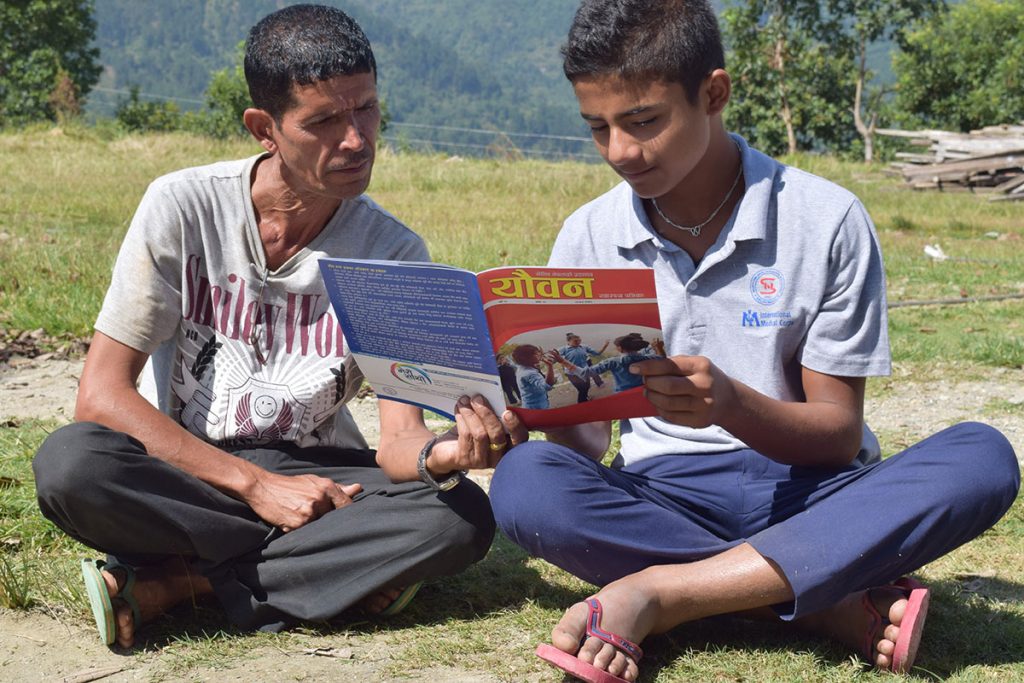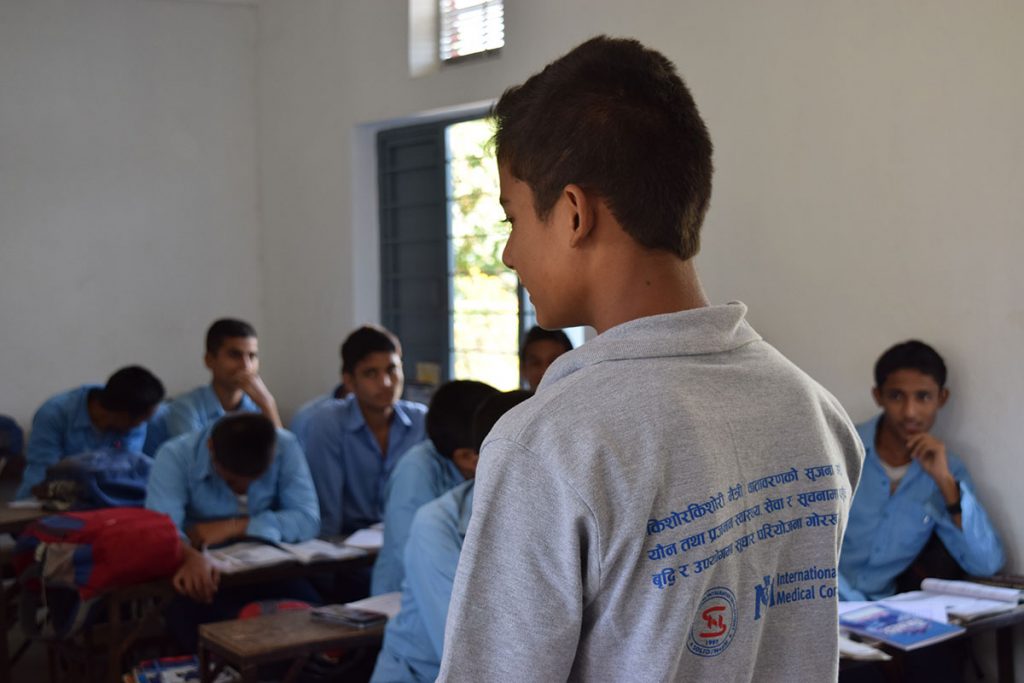Together with the local national non-government group SOLID Nepal, International Medical Corps has trained young volunteers as peer educators to communicate vital—and factual—sexual and reproductive health information to their classmates.
The results have been swift and impressive. “The barrier between boys and girls in our school has been broken,” says Saroj Thapa, a 16-year-old boy who works as a volunteer peer educator after receiving training by both groups. “Now we sit at the same desks with girls, even if they are menstruating. No one teases girls anymore.”
Trained peer educators communicated important, factual information.
“We were never allowed to walk to school with girls our age.”
Saroj is from the town of Jaubari in rural Nepal, not far from the epicenter of the devastating 2015 earthquakes that left over 8,000 dead. Growing up, he recalled it was taboo to talk about sex, or even to be seen talking too often with girls. Friendship and conversation between genders was difficult, and usually occurred under the watchful eye of parents and elders.
“People were always suspecting something,” says Saroj. “Sometimes we couldn’t even speak to girls.”
Rural Nepal is bound through tight communities and extended families. Life exists around the daily rhythm of the soil, and a constant countdown to the next colorful festival. While many traditions enrich both community and culture, others hinder communication between genders and generations, blocking critical knowledge of socially sensitive issues–such as sexual and reproductive health, in the process often leaving girls behind.
“During menstruation we had to stay outside the house, sometimes we had to go into sheds with the cows. We were untouchable to family members,” said Muna Thapa Magar, a 16-year-old girl from a village not far from Saroj’s. “During menstruation, we couldn’t even see our brothers.”
Across Nepal many girls of all ages face isolation during their periods, resulting in weeks of missed school each year relative to male classmates. Boys can sometimes reinforce these stigmas, unless they are educated about menstrual cycles.
“We didn’t like to sit on the same benches as girls and if they were having their periods, we would never study together either,” said Shyam Panta, 11.
But given the chance, Nepal’s young people are optimistic and open-minded. When International Medical Corps and SOLID Nepal arrived in Jaubari, Saroj saw a chance to work together in making a positive difference.
After the earthquakes, International Medical Corps provided immediate medical relief, then stayed on in Nepal to help rebuild shattered communities. Part of this effort has included comprehensive Adolescent Sexual and Reproductive Health programs. The programs train healthcare providers in adolescent-friendly health services, mentor parents in effective communication with their children, and educate adolescents by building life skills and providing education on puberty, family planning, and menstrual hygiene management. Girls and boys learn together about healthy relationships and mutual respect between genders, and how to access health services.
In working with International Medical Corps to change the perceptions of his community, Saroj has grown personally as well. His father Dhurba, who received mentoring on parent-child communication, has watched his son’s development with pride.
“Saroj has grown into a confident speaker and an advocate for positive change in the community,” he says.
Speaking about his own experience, Dhurba adds, “I realize now that we parents did not have enough knowledge before.”
International Medical Corps’ Sexual and Reproductive Health program also assists pregnant mothers and their newborns. In nearly every town that offers International Medical Corps-led reproductive health education, there is a mobile maternal health program working through the local health center in partnership with the Nepal Fertility Care Center. In this program, female community health volunteers are given a mobile phone platform that helps register pregnant women in remote villages. Throughout the pregnancy the volunteers send updates to a central system which helps them in coordinating pre and post-natal care visits, watching for danger signs, deliver and obtaining feedback for mothers. Because of this program, the number of antenatal care visits and institutional deliveries in the villages has increased. At the same time, the female volunteers have gained their own skills.

Tikakumari Khadka, 59, is one of many users of a mobile health platform for community health workers.
Tikakumari Khadka, 59, has been a female community health volunteer for 30 years. She is one of many operators of the new maternal health coordination mobile health platform.
“I used to have to travel a long way and across difficult terrain to get information on pregnancies and then deliver it to the health facilities,” she says, “Now we can communicate via the mobile platform.”
Tikakumari, who is illiterate, has mastered the platform and has used it to help people across her community.
“I was terrible with technology before,” she recalled. “I would never have dreamed that I would be able to use a mobile phone to help people with their health. Thankfully my grandson has helped me read the messages and register women.”
Programs that educate adolescents and mentor parents help improve communication about important health topics.

Because of these International Medical Corps initiatives, more people across generations now have access to fundamental reproductive healthcare services. An adolescent learning about reproductive health in school may find their expectant mother guided through her pregnancy by those with modern tools and up-to-date training. In post-earthquake Nepal, change begins with a country’s youth, but is helped along by their elders.
International Medical Corps is honored to be part of that journey.
